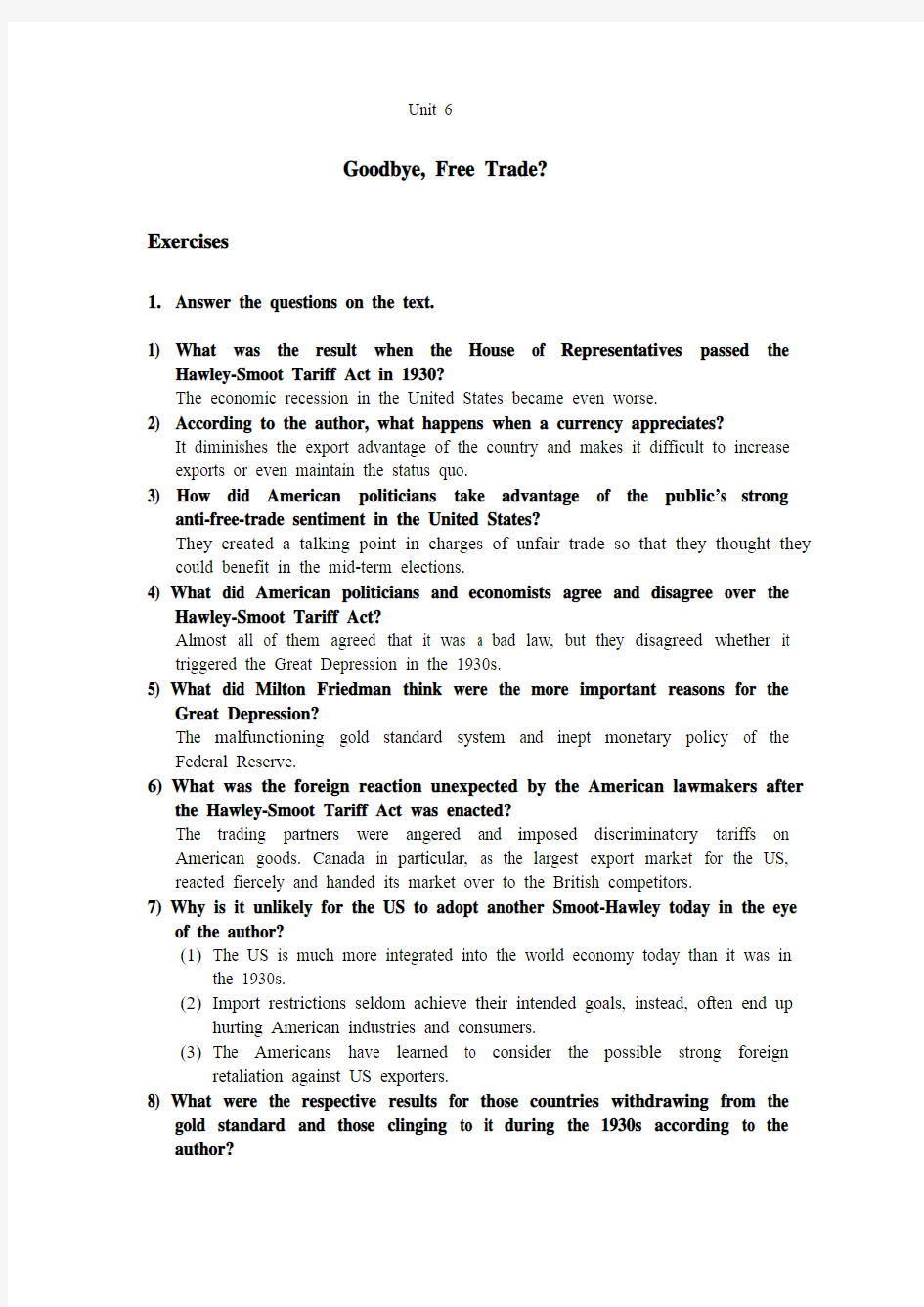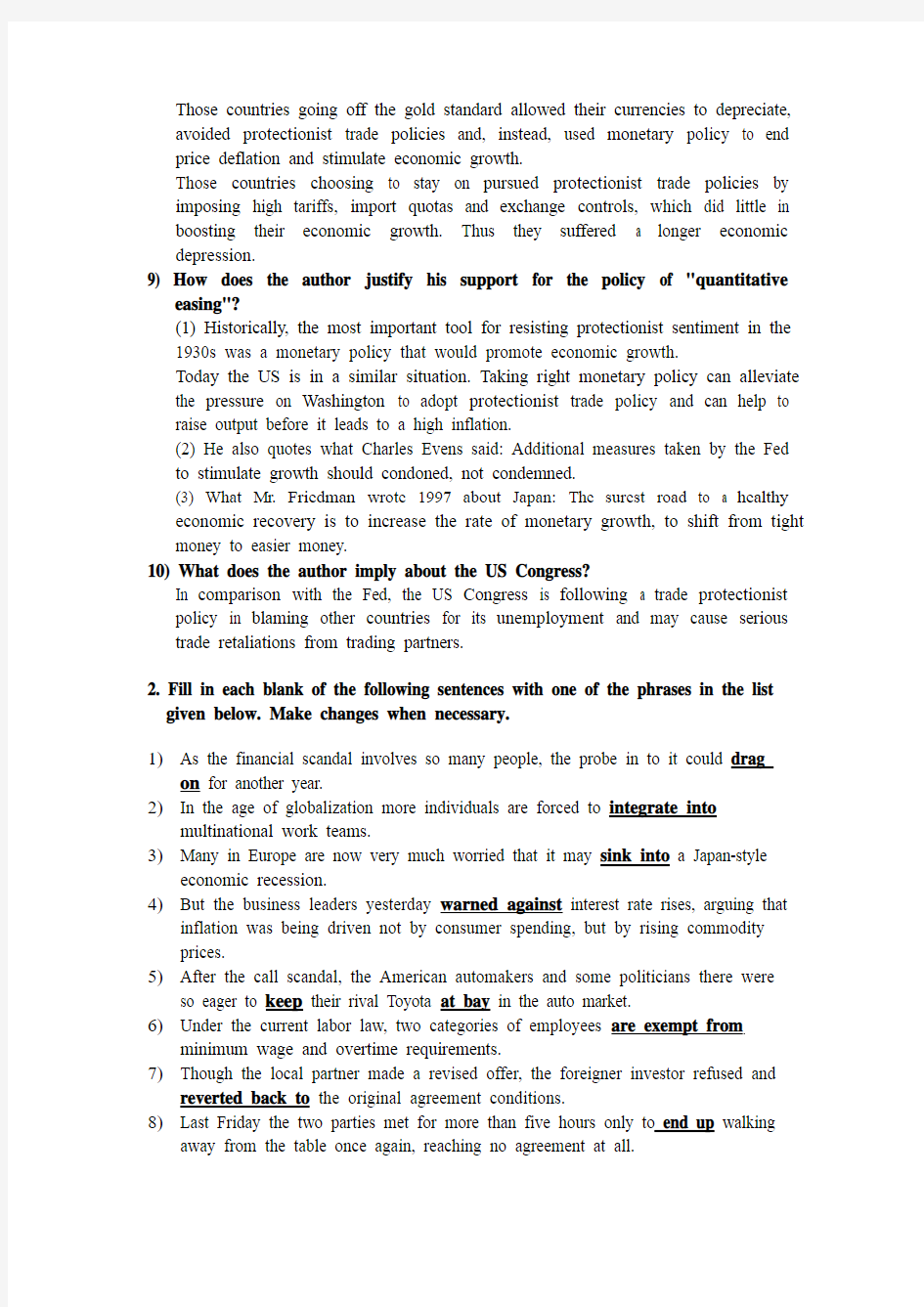#6-t-Goodbye, Free Trade


Unit 6
Goodbye, Free Trade?
Exercises
1.Answer the questions on the text.
1) What was the result when the House of Representatives passed the
Hawley-Smoot Tariff Act in 1930?
The economic recession in the United States became even worse.
2) According to the author, what happens when a currency appreciates?
It diminishes the export advantage of the country and makes it difficult to increase exports or even maintain the status quo.
3) How did American politicians take advantage of the public’s strong
anti-free-trade sentiment in the United States?
They created a talking point in charges of unfair trade so that they thought they could benefit in the mid-term elections.
4) What did American politicians and economists agree and disagree over the
Hawley-Smoot Tariff Act?
Almost all of them agreed that it was a bad law, but they disagreed whether it triggered the Great Depression in the 1930s.
5) What did Milton Friedman think were the more important reasons for the
Great Depression?
The malfunctioning gold standard system and inept monetary policy of the Federal Reserve.
6) What was the foreign reaction unexpected by the American lawmakers after
the Hawley-Smoot Tariff Act was enacted?
The trading partners were angered and imposed discriminatory tariffs on American goods. Canada in particular, as the largest export market for the US, reacted fiercely and handed its market over to the British competitors.
7) Why is it unlikely for the US to adopt another Smoot-Hawley today in the eye
of the author?
(1)The US is much more integrated into the world economy today than it was in
the 1930s.
(2)Import restrictions seldom achieve their intended goals, instead, often end up
hurting American industries and consumers.
(3)The Americans have learned to consider the possible strong foreign
retaliation against US exporters.
8) What were the respective results for those countries withdrawing from the
gold standard and those clinging to it during the 1930s according to the author?
Those countries going off the gold standard allowed their currencies to depreciate, avoided protectionist trade policies and, instead, used monetary policy to end price deflation and stimulate economic growth.
Those countries choosing to stay on pursued protectionist trade policies by imposing high tariffs, import quotas and exchange controls, which did little in boosting their economic growth. Thus they suffered a longer economic depression.
9) How does the author justify his support for the policy of "quantitative
easing"?
(1) Historically, the most important tool for resisting protectionist sentiment in the
1930s was a monetary policy that would promote economic growth.
Today the US is in a similar situation. Taking right monetary policy can alleviate the pressure on Washington to adopt protectionist trade policy and can help to raise output before it leads to a high inflation.
(2) He also quotes what Charles Evens said: Additional measures taken by the Fed
to stimulate growth should condoned, not condemned.
(3) What Mr. Friedman wrote 1997 about Japan: The surest road to a healthy
economic recovery is to increase the rate of monetary growth, to shift from tight money to easier money.
10) What does the author imply about the US Congress?
In comparison with the Fed, the US Congress is following a trade protectionist policy in blaming other countries for its unemployment and may cause serious trade retaliations from trading partners.
2. Fill in each blank of the following sentences with one of the phrases in the list given below. Make changes when necessary.
1)As the financial scandal involves so many people, the probe in to it could drag
on for another year.
2)In the age of globalization more individuals are forced to integrate into
multinational work teams.
3)Many in Europe are now very much worried that it may sink into a Japan-style
economic recession.
4)But the business leaders yesterday warned against interest rate rises, arguing that
inflation was being driven not by consumer spending, but by rising commodity prices.
5)After the call scandal, the American automakers and some politicians there were
so eager to keep their rival Toyota at bay in the auto market.
6)Under the current labor law, two categories of employees are exempt from
minimum wage and overtime requirements.
7)Though the local partner made a revised offer, the foreigner investor refused and
reverted back to the original agreement conditions.
8)Last Friday the two parties met for more than five hours only to end up walking
away from the table once again, reaching no agreement at all.
9)When the government supervises banks, it should take into account their pay
and bonus structures which may often be the source of corruption.
10)The customers severely affected in the incident demanded that the company put
in place effective measures to avoid occurrence of such things in the future. 11)It’s critical to take hold of any opportunity coming your way because it will
never come back again once lost.
12)At times of economic depression, people are more inclined to unethical means in
their business.
3. Match the terms in column A with the definitions in column B:
A__________________________ B____________________________________ 1)unfair trade A) Restrictions that governments put in place
on the purchase or sale of a foreign or local
currency, particularly by those in shortage
of hard currencies. 6
2) real estate B) Escalation of protectionism between two or
more countries that impose punitive tariffs
and barriers in retaliation for each other. 8
3) business cycle C) A general decline in prices often caused by
a reduction in the money supply or a decrease
in spending. 5
4) trade protectionism D) Unjustifiable and discriminatory policies
and supports by a government to its own
firms, ranging from export subsidies to anti-
competitive practices. 1
5) price deflation E) Land, buildings, homes or anything fixed,
immovable, or permanently attached that can
be traded in the market. 2
6) exchange control F) The policy of imposing duties or quotas on
imports in order to protect home jobs,
markets or industries from overseas
competition. 9
7) competitive currency devaluation G) A company or country with whom you have
an ongoing business relationship and engage
in importing or exporting activities. 10
8) trade war H) A predictable long-term pattern of
economic activity that an economy
experiences four stages including decline,
recession, recovery and boom. 3
9) import barriers I) The currency devaluation by a government
to make its goods more competitive in the
international markets. 7
10) trading partner L) The economic policy of restraining
business between states through a variety of
government actions to discourage imports
and prevent foreign take-over of domestic
markets and companies. 4
4. Translate the following passage into Chinese.
按官方的说法,中美间过去三天日益严重的贸易纠纷涉及轮胎、鸡肉和汽车,但实际上远远超出此范围。
双方政府都面临着压力,需要在经济问题上向对方采取更为强硬的立场。尽管双方都试图进行合作以期恢复全球经济并共同去应对所面临的安全威胁,但贸易摩擦却使其政治关系越来越紧张。
本周五奥巴马宣布美国将对中国轮胎征收高达35%的关税,中国商务部对美国的行动做出快速反应,提出了程式化的批评,并在周日晚间宣布它将采取第一批措施,对美国出口的汽车配件和鸡肉征收关税。
中国政府的严厉反制措施是在周末中国网站出现民族主义怒潮后宣布的。有个网民说,“美国真无耻!”,另一个网民则要求中国政府把持有的所有美国国债抛售掉。在中国兴起的民族主义使中国政府官员更难掩饰对美国的批评。
“所有的政策制订,不光贸易政策,都需更多地考虑网民的意见,”经济政策制订方面的美国专家Victor Shih说。
奥巴马对中国轮胎征求关税的决定说明,他打算实现其向工会所做的许诺:更严格地实施贸易法,尤其是对中国,因为中国已成为世界的加工厂而美国则已失去了数百万个制造业的就业机会。2008年与中国的贸易赤字达到创纪录的2680亿美元。
多年来美国政客只要对中国显示强硬立场,对其严格分类的出口产品提出象征性的惩罚措施就能在国内政治中得分获益。在过去5年内,美国限制进口的中国货物种类繁多,包括胸罩和油井设备。
在多数情况下,中国官员会抱怨但很少采取实际行动,更愿意维持一种不平衡的贸易关系,美国向中国销售每1美元的货物就得从中国购买4.46美元的中国货物。
现在这种微妙的平衡正在被打破。中国商务部周日宣布它将对来自美国的一些汽车配件和鸡肉产品的进口展开调查,以确认这些产品是否得到了补贴或是否在中国市场上以低于成本的价格进行倾销。如果这些产品被发现有补贴或倾销,那中国就可以对其征收关税。
商务部在这一宣布中没有提及轮胎纠纷一事,把其展开的调查描述为是“根据国内法律和世界贸易组织规则”进行的。但是这一宣布的时间选择(是在华盛顿宣布轮胎决定后的周末)发出了一个明显的信号:进行贸易报复。官方的新华社网站则在其报道中很明显地将轮胎纠纷和中国的调查联系在一起。
5. Read the following text and choose the best sentence from the list A-E below to fill in each of the gaps in the text.
1)It is also prompting concern among US businesses reliant on the rest of the world
for growth.
2)That is up from 46 per cent three years ago and 32 per cent in 1999.
3)Therefore, they have shifted their opinion and are now expressing significant
concern about the notion of free trade.
4)The rhetoric about these effects may be heated by approaching congressional
elections.
5)They even believe that China has replaced Wall Street as the villain du jour.
Supplementary Reading
Global Trade's New Direction
Reading Comprehension Questions:
1)We can infer from the first paragraph that Singapore Port is very ________
mainly because of its trade relations with ________.
A. slack; India
B. special; Saudi Arabia
C. busy; China∨
D. profitable; the United States
2) Why are Ramadan, Diwali and Chinese New Year given more attention to now?
A. Because Asia has grown to be the trading center in international trade.∨
B. Because people are getting more interested in their cultures.
C. Because they are not so famous outside Asia.
D. Because people want to find out what they really are.
3) Booming trade among Asian countries is challenging ________.
A. the current international trade system
B. the economic dominance in the world
C. the traditional way of trading
D. the dominant position the US dollar in global trade ∨
4) According to the article, China has become ________ for Asian countries.
A. a major import market
B. a major export market ∨
C. a big FDI source
D. a big FDI destination
5. As Planned by Yap, his company’s export to China will increase to ________ in the next five years.
A. 30% ∨
B. 20%
C. 10%
D. 40%
6. In ancient times, it was ________ that linked the whole Asia in trading.
A. Persia
B. South Asian deserts
C. Silk Road ∨
D. caravan routes
7. A HSBC commercial banking official says that trade transactions between Asian countries will ________ in the future.
A. be more attractive to them
B. be more settled in yuan ∨
C. be settled only in US dollar
D. be settled only in yuan
8. As indicated by the author, the purchase of APL by Singapore’s Neptune
symbolizes ________.
A. the loss of the US as the superpower
B. the dominant position of Singapore in global shipping
C. the financial power of Singapore in consolidation
D. the rising of Asia in global trade ∨
